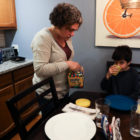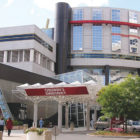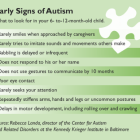Desensitization Gives Some Children With Food Allergies A Viable Treatment Option
|
For Oliver Racco, it’s a part of his daily routine: eating a few peanut M&Ms.
It may seem like a treat to some kids, but for Oliver – and a relatively small but growing number of children – it’s an important way he and his family manage his peanut allergy. Racco, 7, who lives in West Hartford, eats the M&Ms as a daily “maintenance dose,” having recently completed an allergy desensitization process at the New England Food Allergy Treatment Center in West Hartford. The process is intended to protect people with severe allergies in the case of accidental ingestion. “Since we’ve gone through the treatment, it has taken away a lot of that worry,” said Racco’s mother, Jessica. She takes some comfort in knowing her son will be all right if he accidentally eats or is exposed to peanuts, she said.



